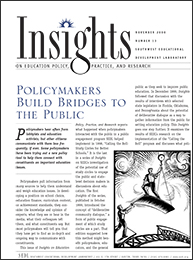Study Circles Increase Information Flow
Community dialogue gives policymakers and constituents the opportunity to explore and develop strategies for change together.
Study circles offer policymakers the opportunity to receive and provide information. By listening to what constituents say and taking their education expertise, experience, and values seriously, policymakers gain valuable information and demonstrate a commitment to the communities they serve. By providing citizens information drawn from their own expertise, experience, and values, policymakers build awareness about important education issues and the state policymaking process. Policymakers who participated in SEDL’s research outlined four ways that study circles increased the flow of information: providing them with access to diverse perspectives, an opportunity to exchange information with constituents, a reality check on their policy directions, and the opportunity to reevaluate or change their perspectives.
Access to Diverse Perspectives
Policymakers stated that the opportunity to hear and consider a wide range of constituent perspectives was the most valuable part of the study circle experience. Because study circles are open to people from all sectors of the community, participants come from a range of educational and socioeconomic backgrounds and with a range of perspectives. One policymaker recalled, "We had minority people, we had businessmen, we had women, we had young people, old people, young parents, people who had kids in school and [kids] no longer in school. Our mayor’s assistant was there. One of the municipal judges was there. It was a good group."
Policymakers saw the views of these individuals as adding balance to the views of lobbyists and other education activists who normally communicate with them. "In spite of all we talk about, all we hear that is wrong with schools, there were . . . students there that night and I thought every one of them was just as impressive as could be. I appreciated that exposure," said one. Some participants recounted personal stories that provided policymakers with the human side of education policy and practice. At other times, it provided a positive counterbalance to the frequent criticisms that policymakers hear about the state of public education. When the "education clique" dominates communications, a policymaker observed, "ordinary teachers don’t get their story out."
Information Exchange
Community dialogue gives policymakers and constituents the opportunity to explore and develop strategies for change together. Policymakers hear various perspectives on education needs, problems encountered, and emerging issues. They add their own perspective to the mix and everyone learns from one other. Policymakers in study circles valued the exchange of information with their constituents. It allowed them to draw upon information in their work that they might not have had access to otherwise and helped them clarify their thinking, especially about local school programs. "I learned of some very good programs that we have in the . . . school system. Since I have no children there and have not been actively involved in [schools for] a while, I didn’t know about those programs," a policymaker remarked.
Other policymakers talked about how they hoped study circles would create a more informed citizenry. They saw one of their own roles as being a source of information for citizens, both on important education matters and on the nature of the policymaking process itself. By helping the public gain new or better insight into education issues, they hope to increase the depth of the dialogues they have with the public. One policymaker cited the "civility" with which participants addressed each other as the best part of study circles. "I’ve had what some would call town hall meetings [where] some people would stand up and start hollering and then the meeting would just totally get out of control. Conversely in the study circles, that respondent observed that "everybody knew that they were there to try to accomplish something."
Reality Check on Policy Directions
Policymakers strive to achieve a measure of alignment between the needs, opinions, and values of their constituents before their policy directions harden. For that reason, they viewed study circles as tools with which to check their perceptions of issues and public attitudes. While the small-group format was never expected to produce broad consensus on education policies and programs, it did help reduce uncertainty about what citizens were actually thinking and the reasons behind their thinking, which was more than policymakers said they usually got from opinion polls and focus groups. Several policymakers underscored the point that such reality checks were necessary to reach a balanced understanding of the issues and to affirm for themselves that their stance on an issue was indeed correct. Sometimes, this information reinforced what policymakers already thought and believed. Such was the case for one policymaker who noted, "It makes me feel stronger because . . . I opposed it already and so having been there and feeling like everybody else felt the same way about it . . . and had the same concerns makes me stronger in my opposition to it."
Reevaluation or Change in Perspectives
Sometimes new information gleaned from study circles pointed the way toward corrections in policy directions. Several policymakers who participated in study circles reported that the dialogue to which they were exposed changed their opinion or enabled them to see education issues from a new light. Most often they developed new perspectives on local education efforts by teachers and parents. One respondent said study circles "increased my opinion of teachers so I tend to be on their side a little more." Another explained his changed view of education this way: "Schools are more of a local issue than I thought. That is to say that the problems that people perceive: . . . discipline problems, teacher problems . . . are more local in nature and . . . you couldn’t cure them if you wanted to from the state level."
Next Page: Study Circles Affect Relationships

